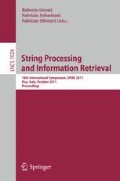Abstract
We propose to explain Discounted Cumulative Gain (DCG) as the consequences of a set of hypothesis, in a generative probabilistic model, on how users browse the result page ranking list of a search engine. This exercise of reconstructing a user model from a metric allows us to show that it is possible to estimate from data the numerical values of the discounting factors. It also allows us to compare different candidate user models in terms of their ability to describe the observed data, and hence to select the best one. It is generally not possible to relate the performance of a ranking function in terms of DCG with the clicks observed after the function is deployed on a production environment. We show in this paper that a user model make this possible. Finally, we show that DCG can be interpreted as a measure of the utility a user gains per unit of effort she is ready to allocate. This contrasts nicely with a recent interpretation given to average precision (AP), another popular Information Retrieval metric, as a measure of effort needed to achieve a unit of utility [7].
Access this chapter
Tax calculation will be finalised at checkout
Purchases are for personal use only
Preview
Unable to display preview. Download preview PDF.
References
Bollmann, P., Raghavan, V.V.: A utility-theoretic analysis of expected search length. In: SIGIR 1988, pp. 245–256. ACM, New York (1988)
Buckley, C., Voorhees, E.M.: Retrieval evaluation with incomplete information. In: SIGIR 2004, pp. 25–32. ACM, New York (2004)
Carterette, B., Jones, R.: Evaluating search engines by modeling the relationship between relevance and clicks. Advances in Neural Information Processing Systems 20, 217–224 (2008)
Craswell, N., Zoeter, O., Taylor, M., Ramsey, B.: An experimental comparison of click position-bias models. In: First ACM International Conference on Web Search and Data Mining, WSDM 2008 (2008)
Dempster, A.P., Laird, N.M., Rubin, D.B.: Maximum likelihood from incomplete data via the EM algorithm. J. R. Statist. Soc. B 39, 1–38 (1977)
Dupret, G.: User models to compare and evaluate web IR metrics. In: Proceedings of SIGIR 2009 Workshop on The Future of IR Evaluation (2009), http://staff.science.uva.nl/k̃amps/ireval/papers/georges.pdf
Dupret, G., Piwowarski, B.: A User Behavior Model for Average Precision and its Generalization to Graded Judgments. In: Proceedings of the 33th ACM SIGIR Conference (2010)
Führ, N.: A probability ranking principle for interactive information retrieval. In: Information Retrieval. Springer, Heidelberg (2008)
Granka, L., Joachims, T., Gay, G.: Eye-tracking analysis of user behavior in www search. In: ACM SIGIR Conference on Research and Development in Information Retrieval (SIGIR), pp. 478–479 (2004)
Guo, F., Liu, C., Wang, Y.M.: Efficient multiple-click models in web search. In: WSDM 2009: Proceedings of the Second ACM International Conference on Web Search and Data Mining, pp. 124–131. ACM, New York (2009)
Järvelin, K., Kekäläinen, J.: Cumulated gain-based evaluation of ir techniques. ACM Transactions on Information Systems (ACM TOIS) 20(4), 222–246 (2002)
Kelly, D.: Methods for Evaluating Interactive Information Retrieval Systems with Users. Foundations and Trends in Information Retrieval, vol. 3 (2009)
Moffat, A., Zobel, J.: Rank-biased precision for measurement of retrieval effectiveness. ACM Trans. Inf. Syst. 27(1), 1–27 (2008)
Robertson, S.: A new interpretation of average precision. In: SIGIR 2008, pp. 689–690. ACM, New York (2008)
Voorhees, E.M., Harman, D. (eds.): TREC: Experiment and Evaluation in Information Retrieval. MIT Press, Cambridge (2005)
Yilmaz, E., Aslam, J.A., Robertson, S.: A new rank correlation coefficient for information retrieval. In: SIGIR 2008: Proceedings of the 31st Annual International ACM SIGIR Conference on Research and Development in Information Retrieval, pp. 587–594. ACM, New York (2008)
Author information
Authors and Affiliations
Editor information
Editors and Affiliations
Rights and permissions
Copyright information
© 2011 Springer-Verlag Berlin Heidelberg
About this paper
Cite this paper
Dupret, G. (2011). Discounted Cumulative Gain and User Decision Models. In: Grossi, R., Sebastiani, F., Silvestri, F. (eds) String Processing and Information Retrieval. SPIRE 2011. Lecture Notes in Computer Science, vol 7024. Springer, Berlin, Heidelberg. https://doi.org/10.1007/978-3-642-24583-1_2
Download citation
DOI: https://doi.org/10.1007/978-3-642-24583-1_2
Publisher Name: Springer, Berlin, Heidelberg
Print ISBN: 978-3-642-24582-4
Online ISBN: 978-3-642-24583-1
eBook Packages: Computer ScienceComputer Science (R0)

